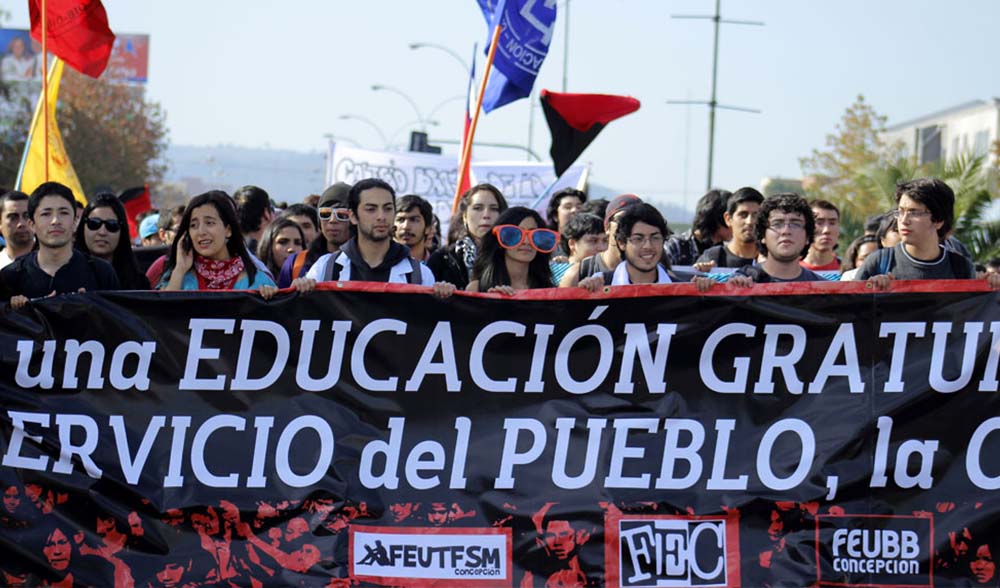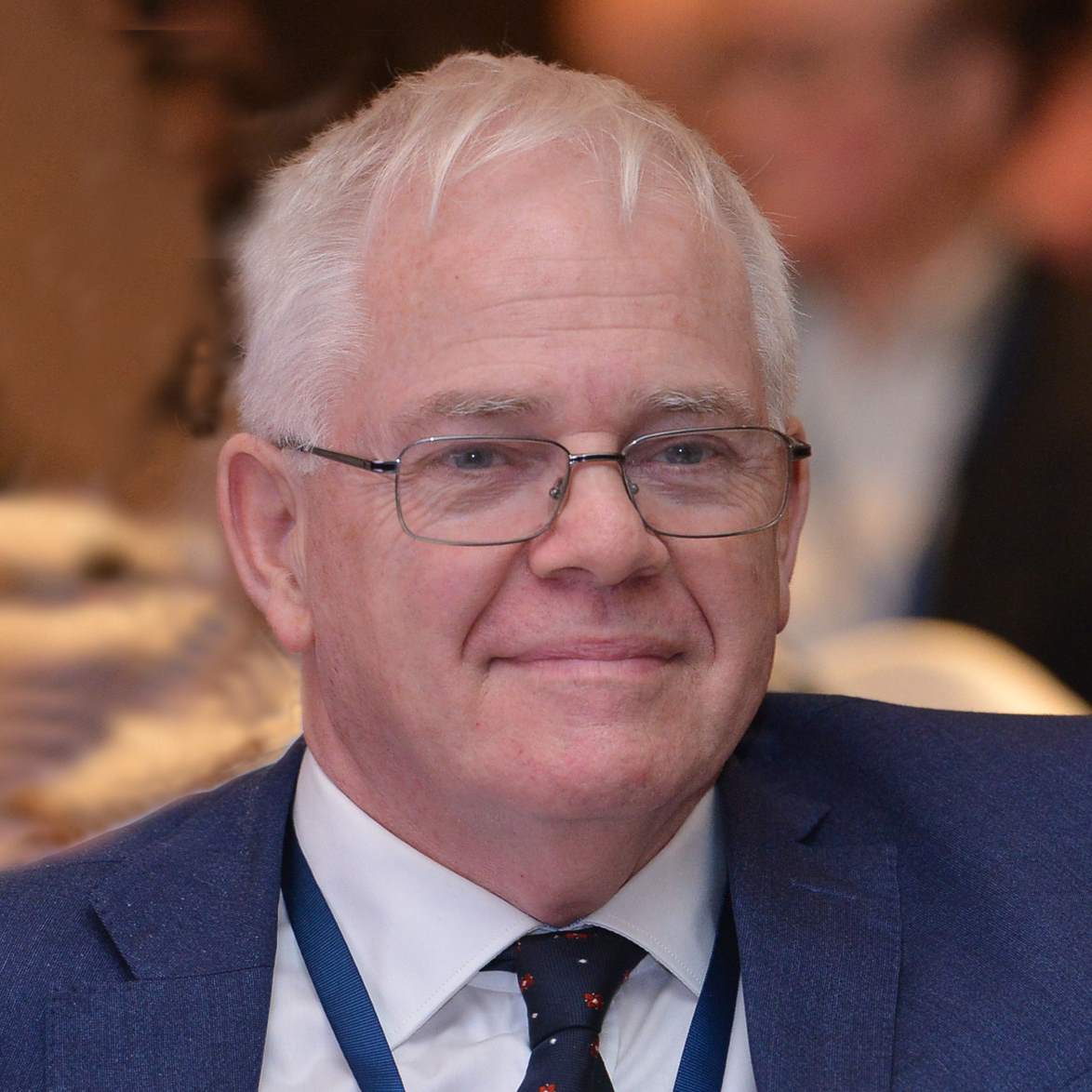‘Higher education and knowledge in Latin America past, present and future’ series – webinar 3: Internationalisation and student mobility in Latin American higher education
- CHAIR: Simon Marginson, University of Oxford, UK
- Kyria Finardi, Universidade Federal do Espírito Santo, Brazil
- Carolina Guzmán Valenzuela, Universidad de Tarapacá, Chile
Event Materials
This event is now archived and we are pleased to provide the following event media and assets, along with the original event overview.

Student demonstration in Chile. From ‘America’s Quarterly’, 28 January 2016. Photo credit: Luis Gustavo Zamudio, 8 May 2013.
Webinar 3 in the series focuses specifically on internationalisation, which is an increasing focus of many Latin American universities, academics and students as in other parts of the world. International networks facilitate not only academic exchange but also transactions of academic capital. Here international rankings and competition for prestige and resources have quickened the emphasis on one kind of internationalisation. Internationalised universities attract attention, prestige and resources for research and are often favoured by national governments and elites. Academic prestige and being international are mutually constitutive and reinforce each other and they both secure circulation of research knowledge, prestige and income.
However, internationalisation processes involve complex relationships among disciplines, universities, language, wealth and prestige, and between the colonial past and the present, that are not always visible. Universities in less affluent parts of Latin America struggle to gather the resources for scientific research and meet the specifications for internationally recognised prestige, and in all countries the desires and pressures to become internationalised trigger key issues and dilemmas. To what extent should universities draw on external templates that follow the global North? To what extent should they focus on English language scholarship rather than work in Spanish and Portuguese? To what extent should they mirror the structure, governance and mission of the US universities that lead in global rankings? And on the other hand, can they use student mobility and research collaboration within Latin America region to carve out distinctive internationalisation pathways that build mutual capacity and foster regional collaboration and solidarity?
Much of the discussion about internationalisation concerns academic mobility, student mobility and research collaboration. Kyria Finardi will focus on concepts, views and practices of international student mobility in the region. She will review the evolution of international higher education in Latin America, including the colonial legacy, and consider the potentials for decolonial student mobility in a post-COVID era. Carolina Guzmán-Valenzuela examines international research collaboration (articles with authors from more than one country) in Latin America as an expression of internationalisation.
About the CGHE webinar series on higher education and knowledge in Latin America past, present and future
Latin American countries and their universities share a common historical legacy although each national systems in the region exhibits its own particularities and richness. The first universities in Latin America were established half a century after Columbus landed in the Americas in 1492. Since then, thousands of universities have opened, evolved or disappeared in response to national developments and needs, and global trends.
A key feature that characterises Latin American universities is their autonomy. During colonial times, universities progressively gained autonomy from the Catholic church. After independence the universities were intent on supporting nation building and focused on professional training but during the first three decades of the nineteenth century, the Cordoba movement in Argentina had a significant role in reasserting university autonomy across the region. It promoted both university self-governance and wider participation. Students pursued the modernisation of universities within larger agendas of democracy, academic freedom and social responsibility.
Between the 1970s and the 1990s Latin American Universities and academics were repressed and punished by military dictatorships. They also experienced massification and recurring financial crises, trends that continued after the 1990s, and a growing emphasis on evaluation and accreditation.
Latin American universities, like many universities around the world, are now shaped by internationalisation, privatisation and marketisation trends. They still need to defend and advance their autonomy. They also need to improve their research and knowledge production while helping to advance social changes and a more equal society. Many Latin American universities have been working on agendas of widening participation and inclusivity. They have also been wrestling with their colonial past, which has continuing implications for the review and transformation of their local, national and global roles. The role of intercultural universities in decolonising the curriculum has been an important development.
In this CGHE webinar series the speakers and participant audiences will examine key challenges for Latin American higher education. While reviewing the past and investigating the present, the webinars highlight crucial aspects of higher education in the region that provide insights into the future. The first webinar on 30 June discusses political and economic aspects of higher education reforms in Latin America. The second webinar on 5 July considers the impact of university rankings and the concept of ‘world class universities’ on the institutions and in academic careers, and the implications for regional university autonomy and development. The third webinar on 7 July dissects internationalisation and student mobility in and beyond the region. The final webinar in the series on 12 July tackles the big underlying issue of the past, present and future, the decolonisation of universities and knowledge in Latin America and the role of intercultural education as a strategy of decolonisation.
The series is organised by Martin Benavides Abanto from Peru, Carolina Guzmán-Valenzuela of Chile and CGHE’s Simon Marginson, with the help of CGHE Director of Communications Trevor Treharne and colleagues throughout the region.
You need to register individually for each webinar in the series. You can register for the other webinars in the series here.
Event Materials
This event is now archived and we are pleased to provide the following event media and assets, along with the original event overview.




